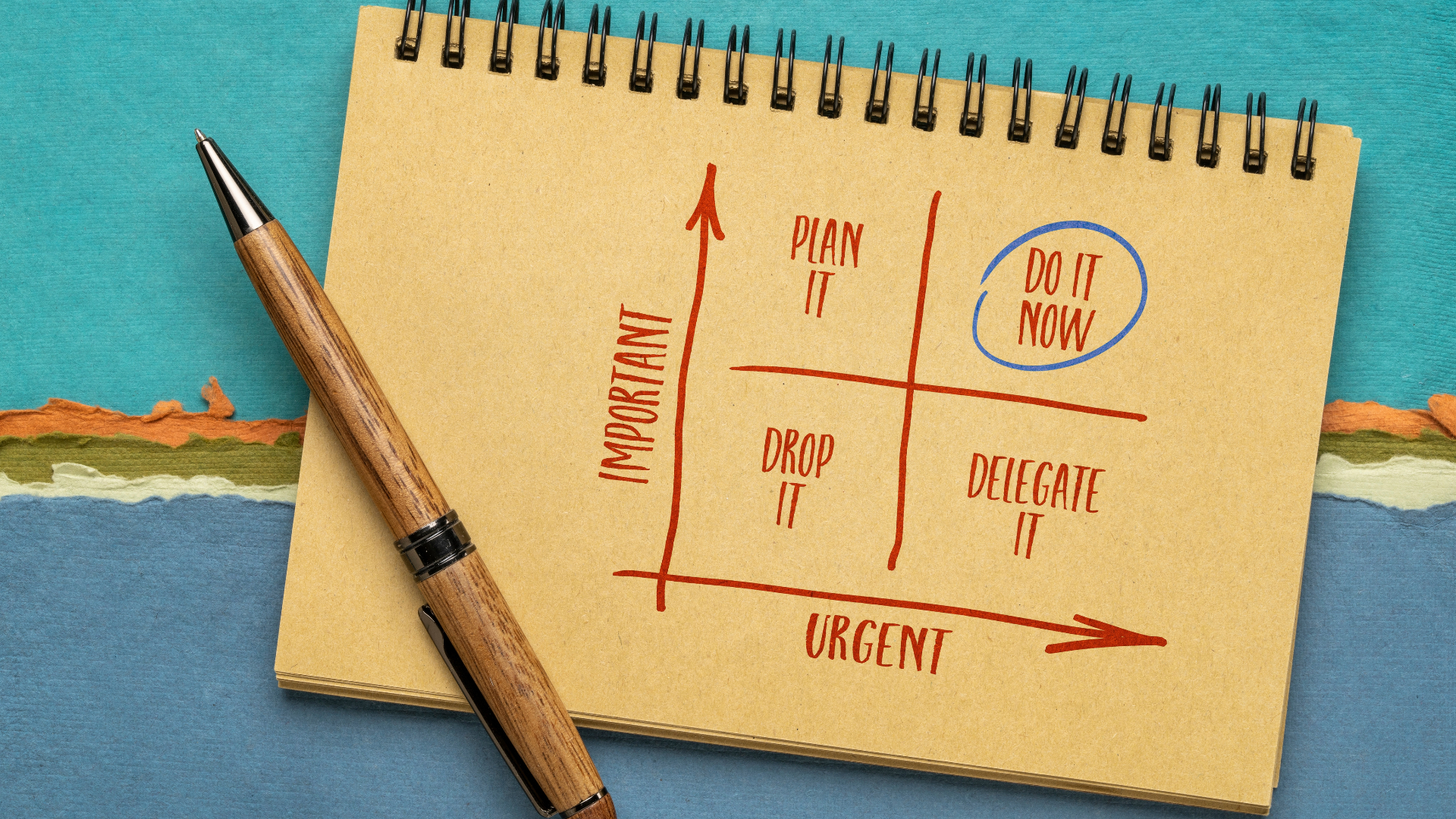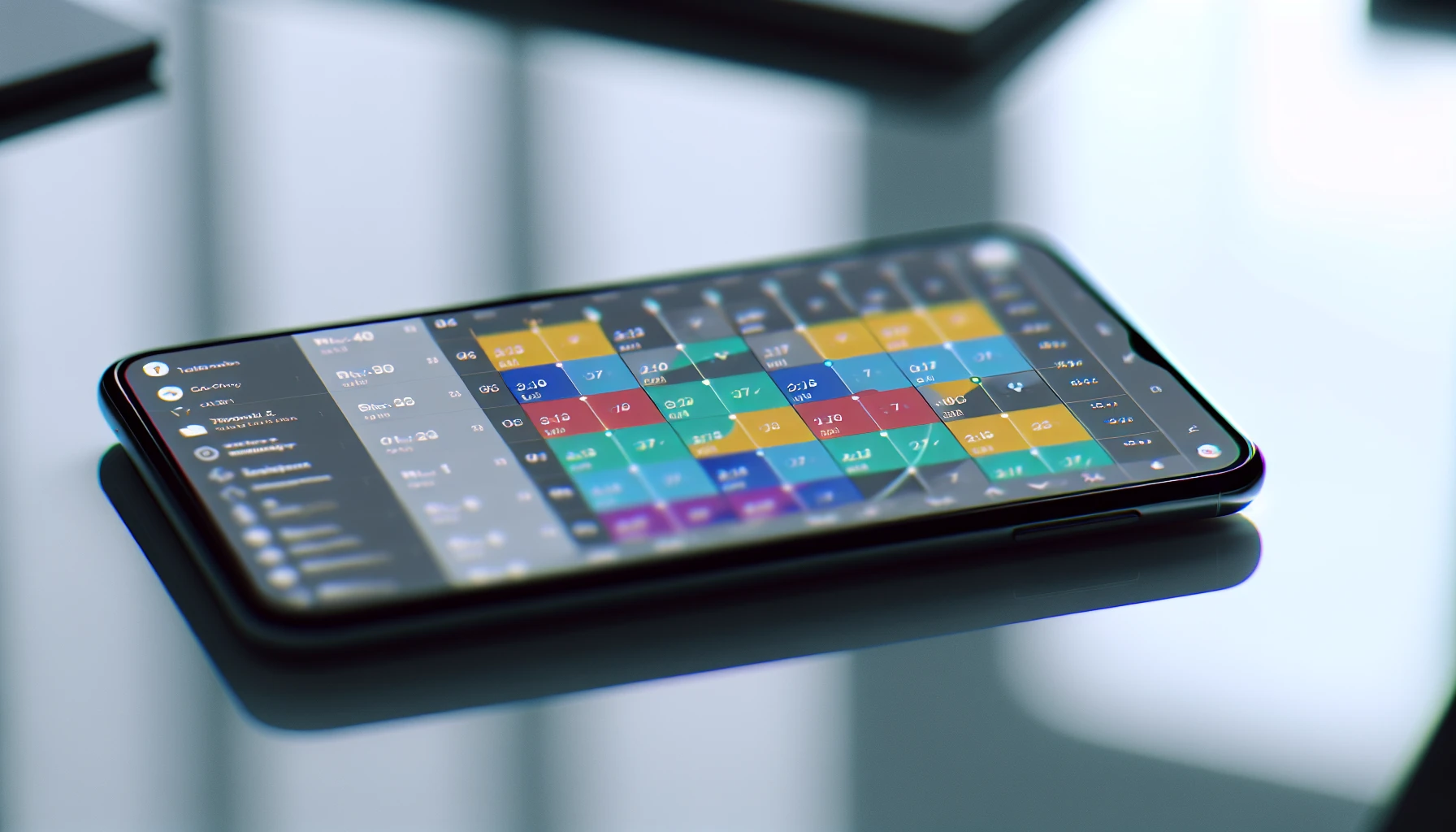Master Effective Time Management: Strategies for Maximizing Productivity
Are you struggling to accomplish everything on your to-do list, feeling overwhelmed, or wondering how others seem to get so much done? The answer lies in mastering the art of time management. This blog post will provide actionable strategies, techniques, and tools to enhance productivity and have enough time to achieve a balanced life.
Discover the essence of effective time management, develop good time management skills, and explore powerful techniques like the Pomodoro Technique and time blocking. We’ll also discuss the importance of balancing work and personal life and how technology can be leveraged to maximize your personal time management. Let’s embark on this journey towards maximizing productivity and well-being!
Key Takeaways
- Time management is an essential skill for success, productivity and work-life balance.
- Develop self-discipline and use techniques such as the Pomodoro Technique to stay motivated and productive.
- Set boundaries, manage distractions & prioritize tasks to maximize your time management skills!
The Essence of Effective Time Management

Time management is not just about crossing tasks off your to-do list; it’s about making the most of your time by organizing, planning, and prioritizing tasks to maximize productivity and achieve your goals. Effective time management is considered an essential soft skill, especially when handling important tasks. Mastering the art of managing, organizing, and distributing time allows you to excel in time management.
The first step to maximizing your time is setting goals and determining what is most important. Good time management skills involve honing your abilities in prioritization, planning, and self-discipline. Planning and setting time limits on tasks and priorities enables effective time management, freeing up more time for what matters most to you.
Time Management vs. Being Busy
A common misconception about time management is that it’s all about accomplishing as many tasks as possible before becoming overwhelmed. However, effective time management focuses on SMART goals:
- Maximizing productivity
- Helping you reach your goals
- Prioritizing tasks based on importance and urgency
- Setting realistic deadlines
- Avoiding multitasking and focusing on one task at a time
It’s about being busy with other tasks, and effectively using your time.
Effective time management is an invaluable tool for success in work environments. It helps you:
- Prioritize tasks
- Identify the most important work
- Increase efficiency and performance
- Reduce stress
- Maintain a better work-life balance
Mastering time management skills aids in staying organized, reducing stress, and maintaining a better work-life balance, proving indispensable for maximizing productivity and achieving goals.
The Role of Prioritization
Prioritization is crucial in time management, ensuring you focus on the most important tasks and avoid potential distractions. One way to prioritize your demands wisely is by using the Eisenhower’s Urgent/Important Principle or the Action Priority Matrix to explore how much time to give to different activities and prioritize them accordingly.

Creating a priority list can help you feel accomplished and motivated. Focusing on the most important tasks first aids in maximizing productivity and ensures effective time utilization on the urgent tasks that matter the most.
Developing Good Time Management Skills

Developing good time management skills requires self-reflection, goal setting, and learning to manage distractions and maintain focus. Time management techniques like the Time Flow System, the Pomodoro Technique, and Time Blocking and Focus Blocks can help you manage your time more effectively. Moreover, delegating tasks ensures that work is assigned to the right people based on their skills and abilities, allowing you to focus on more challenging tasks and maintain a healthy work-life balance. Following these time management tips can improve your overall productivity and help you achieve your goals.
Building and following a system diligently is essential for improving time management skills. Tackling procrastination and avoiding multitasking are also important for staying motivated and productive. We will now examine these aspects of developing good time management skills in greater detail.
Self-Reflection and Goal Setting
Setting clear, achievable goals and regularly reflecting on progress can help you improve your time management skills and reach your goals. When you have clear goals, you know precisely which tasks to prioritize and focus on, helping you avoid wasting time on activities that are not aligned with your goals. Goal setting can also motivate you to take action and push through any challenges that come your way, as you have a clear vision of what you want to accomplish.
Make the most of self-reflection in time management by:
- Utilizing frameworks like the SMART model
- Incorporating self-reflection and feedback
- Adapting your approach based on reflection
- Assessing which learning strategies you need
Regular self-reflection and goal setting are integral components for successful time management.
Managing Distractions and Maintaining Focus
Minimizing distractions is crucial in time management, as it helps you stay focused and maximize productivity. Here are some ways to stay focused and avoid distractions:
- Create an environment free from unnecessary distractions
- Set boundaries with colleagues
- Use “do not disturb” modes on electronic devices
- Commit to a single task rather than multitasking
By implementing these strategies, you can create a more focused and productive work environment.
Understanding your peak productivity times during the day and scheduling challenging tasks accordingly can help you stay focused. Common distractions such as phones, stress, and meetings can significantly reduce focus and increase stress levels, ultimately decreasing productivity.
Managing distractions and maintaining focus enhances time management and aids in achieving your goals.
Ready to Transform Your Time Management Skills?
Connect with me today to uncover personalized strategies and coaching that will elevate your productivity and balance. Let’s turn your time into your greatest asset together!
Time Management Techniques for Success

Time management techniques, such as the Pomodoro Technique and time blocking, can help individuals work more efficiently and achieve their goals. These methods can be employed to:
- Improve focus
- Discourage multitasking
- Protect time for important tasks
- Optimize the use of working hours
- Eliminate distractions
This leads to improved time management and increased productivity.
We will now examine the Pomodoro Technique and time blocking, two powerful time management techniques that can revolutionize productivity and optimize available time usage.
The Pomodoro Technique
The Pomodoro Technique is a time management method that involves breaking work into short, focused intervals with regular breaks, typically 25 minutes per interval. Invented by Italian Francesco Cirillo, this technique encourages you to break tasks into smaller segments of focused work, followed by short breaks to recharge your mind.

Regular breaks during the Pomodoro Technique can help you stay focused and motivated, allowing you to maintain focus and energy levels for longer periods. Research shows that brief breaks from a task can improve your ability to concentrate on that task for extended periods.
Breaking up work and breaks into regular, short increments helps avoid feeling overwhelmed and maintains motivation to keep working smarter and achieve more in less time.
Time Blocking
Time blocking is a time management technique that involves scheduling specific tasks during designated time slots, helping individuals stay organized and focused. By assigning specific time slots for different activities or tasks you can prevent excessive browsing and stay focused on important tasks by assigning specific time slots for different activities or tasks. A variety of professions and tasks can benefit from time blocking, such as:
- Project managers
- Entrepreneurs
- Students
- Freelancers
- Professionals with varied responsibilities
To implement time blocking effectively, follow these steps:
- Set clear goals for your day or week.
- Prioritize tasks.
- Break your day into focused time blocks.
- Allocate specific time slots for different tasks.
- Stick to your schedule.
Following these steps ensures optimal use of time and keeps you on track to achieve your goals through an ongoing process.
Balancing Work and Personal Life

Balancing work and personal life is essential for overall well-being and effective time management. One way to achieve this balance is by learning to say no to non-priority tasks and setting boundaries with colleagues. This can help you prioritize the most important things by focusing on the important tasks and not overloading yourself with less important tasks.
By taking regular breaks and setting boundaries, you can maintain a healthy work-life balance and be more productive. We will now examine the importance of regular breaks and setting boundaries in greater detail.
Importance of Regular Breaks
Regular breaks are crucial for maintaining focus, boosting creativity, reduced stress, and preventing burnout. Research has revealed that taking regular breaks can not only increase productivity but also stimulate more insightful and creative thinking. Incorporating breaks into daily routines can help sharpen focus, boost creativity, and reduce stress.
Moreover, even micro-breaks, like standing up to stretch, have been found to have a positive impact on work performance. Regular breaks can help you stay energized and motivated at work by:
- reducing exhaustion
- preventing mental and physical exhaustion
- reducing stress
- increasing productivity and motivation
- preventing mental health problems such as anxiety
Incorporating regular breaks into your routine helps maintain focus and productivity while safeguarding mental well-being.
Setting Boundaries and Saying No
Setting boundaries and learning to say no to non-priority tasks helps maintain a healthy work-life balance. By being cooperative while still saying no to non-priority tasks, you can ensure that everyone is taking a piece of your time and leaving nothing for yourself or the most important tasks.
Learning to say no can help you prioritize the most important things by saying ‘yes’ to the critical ones and ‘no’ to the less important ones. Setting boundaries and saying no helps focus on what truly matters and ensures the most effective use of your time.
Leveraging Technology for Time Management

Technology can be a great ally in managing your time effectively. Here are some tools that can help:
- Project management software
- Calendar apps
- Task tracking tools
- Distraction management tools
These tools can help you stay organized, prioritize tasks, track time, and minimize distractions, leading to improved time management and increased productivity.
We will now examine some popular calendar and scheduling tools and apps designed to minimize distractions and maintain focus on important daily tasks.
Calendar and Scheduling Tools
Calendar and scheduling tools, such as Google Calendar, can help you plan and prioritize tasks efficiently to maximize your time. Google Calendar offers helpful features to schedule, delegate tasks, and manage your time, such as:
- Find a Time
- World Clock
- Desktop Notifications
- Appointment Schedules
These features can help you make the most of your time.
In addition to Google Calendar, there are several other great options available, such as:
- ClickUp
- ActiveCollab
- Harvest
- ProofHub
- Clockify
- Toggl Track
These tools can help you manage your time effectively, stay organized, prioritize tasks, and track time, leading to improved time management and increased productivity.
Apps for Minimizing Distractions
Apps like Forest and StayFocused can help you stay focused and minimize distractions to stay on top of important tasks. The Forest app can help you stay focused and minimize distractions by providing a gamified timer that encourages you to stay on your important task more. When you want to concentrate, you can “plant a tree” in the app, and as time goes by without using your phone, the tree grows. This visual representation of your focused time helps reduce distractions and promotes productivity so you can get the most out of your day.
The StayFocused app can help you stay focused on tasks by blocking distracting websites and limiting the time spent on them. It allows you to set specific time limits for certain websites or categories for specific blocks of websites so you can prevent excessive browsing and stay productive. Leveraging these apps helps minimize distractions and maintain focus on the tasks that matter most.
Tips for Overcoming Time Management Challenges
Overcoming time management challenges like procrastination and multitasking can increase productivity and success. Here are some strategies to help you overcome these challenges:
- Set and maintain priorities.
- Avoid procrastination by breaking tasks into smaller, manageable steps and setting deadlines for each step.
- Focus on one task at a time, avoiding multitasking.

By implementing these strategies, you can maximize your productivity and reach your goals.
We will delve deeper into tackling procrastination and avoiding multitasking, two common time management challenges hindering productivity and success.
Tackling Procrastination
Tackling procrastination involves identifying the root cause and taking small, deliberate steps to overcome it. Some common causes of procrastination include:
- Stress
- Negative beliefs about yourself
- Lack of motivation or interest in the task
- Self-doubt
- Low self-esteem
- Anxiety
- Insecurity
- Perfectionism
- Feelings of depression
- Fear of failure
By understanding the underlying causes of your procrastination, you can develop strategies to address them and improve your productivity.
Recognizing and addressing the underlying reason and taking small, purposeful steps to surmount it aids in conquering procrastination and improving time management skills. Regular self-reflection and goal setting are integral to successful time management and overcoming procrastination.
Avoiding Multitasking
Focusing on one task at a time can help you increase productivity and decrease the risk of making mistakes. Research has revealed that even brief pauses caused by switching between tasks can cost up to 40% of productive time, and engaging in social media multitasking has been demonstrated to decrease productivity by 40% and raise stress levels.
Avoiding multitasking and focusing on one task simultaneously enhances productivity and reduces the risk of errors. This will enable you to work more efficiently, resulting in higher quality work and faster completion times.
Summary
In conclusion, effective time management involves planning, organizing, and prioritizing tasks to maximize productivity and achieve a balanced life. You can overcome time management challenges and achieve your goals by developing good time management skills, leveraging technology, and utilizing techniques such as the Pomodoro Technique and time blocking.
Remember that maintaining a healthy work-life balance, setting boundaries, and taking regular breaks are essential for your overall well-being and success. Embrace these strategies, and you’ll be well on your way to maximizing productivity with less stress, and living a more fulfilling life.
Achieve More with Expert Guidance:
Don’t let time slip away! Reach out now for expert coaching in time management techniques that cater to your unique needs. Together, we’ll unlock your full potential for success and well-being.
Click here to schedule a call TODAY!
Frequently Asked Questions
What is effective management of time?
Time management is the process of planning and organizing one’s activities to maximize productivity and effectiveness. It involves setting goals, creating a structured schedule, prioritizing tasks, and consciously controlling time spent on specific activities to get more done in less time. The highest achievers manage their time exceptionally well, enabling them to work smarter, not harder.
What are the 5 P’s of time management?
Time management is made easier with the 5 Ps: Pick your battles, Prioritize, Plan, Prepare, and Put into action. These key points will help you take control of your time and reach success!
How can I improve my time management skills?
Take action by setting goals, prioritizing tasks, minimizing distractions, managing your focus and using technology to stay organized – and you’ll soon see improvements in your time management skills!
What is the Pomodoro Technique?
The Pomodoro Technique helps you stay focused and productive by breaking work into short, 25-minute intervals with breaks in between – giving you more control of your workflow.
How can I balance work and personal life?
Set boundaries, prioritize tasks, and take breaks to balance work and personal life for short- and long-term success.



